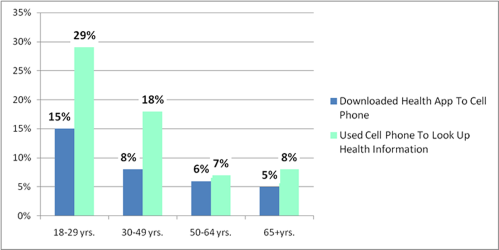January 21st, 2011 by KevinMD in Better Health Network, Opinion
2 Comments »

Many doctors roll their eyes whenever patients bring in a stack of research they printed out, stemming from a Google search of their symptoms. A piece by Dr. Zachary Meisel on TIME.com describes a familiar scenario:
The medical intern started her presentation with an eye roll. “The patient in Room 3 had some blood in the toilet bowl this morning and is here with a pile of Internet printouts listing all the crazy things she thinks she might have.”
The intern continued, “I think she has a hemorrhoid.”
“Another case of cyberchondria,” added the nurse behind me.
It’s time to stop debating whether patients should research their own symptoms. It’s happening already, and the medical profession would be better served to handle this new reality.
According to the Pew Internet and American Life Project, 61 percent of patients turn to the web to research health information. That number is from 2009, so presumably it’s higher today. Health information online is akin to the Wild, Wild West. Stories from questionable sites come up on Google as high — or higher — than information from reputable institutions. Read more »
*This blog post was originally published at KevinMD.com*
December 23rd, 2010 by Berci in Better Health Network, Health Tips, News
No Comments »

HealthMash, WebLib’s next-generation semantic health search engine, will release an iPhone application in January. It utilizes proprietary natural language processing and semantic technology tools and resources in order to find highly relevant, reliable, and recent health information from the most trusted sources and facilitate user exploration and discovery.

*This blog post was originally published at ScienceRoll*
November 18th, 2010 by StevenWilkinsMPH in Better Health Network, News, Opinion, Research
No Comments »

What do cell phones and health-information seeking have in common? Very little, at least among the chronically ill (e.g., the folks who are driving healthcare use and cost). An American Medical News article about the latest Pew Research Center’s Internet & American Life Project study on mobile phone use caught my eye. The introduction to the article reads:
Despite the proliferation of cell phones in the United States, the number of people using them to access health information is low. But experts believe the sheer number of people using mobile phones and wireless devices means that health information eventually will get more mobile as well.
According to the study, 85 percent of Americans use mobile phones, but only 17 percent of cell phone owners have used them to look up health information. Nine percent of Americans have downloaded a health-related app on their cell phone.

Get this: The highest use of cell phone health-information seeking and downloading cell phone health apps was among 18- to 29-year olds at 29 percent and 15 percent respectively. With the exception of accidents, 18- to 29-year-old adults are generally among the most healthy demographic. Read more »
*This blog post was originally published at Mind The Gap*
November 7th, 2010 by EvanFalchukJD in Better Health Network, Health Tips, News, Research
No Comments »

“What’s the highest peak in North America, Mt. McKinley or Denali?” This is a great question the Web can answer for you. “What’s that lump on my neck?” This is another great question — but not one you should rely on the Web to solve.
Best Doctors recently conducted a Twitter-based poll to find out what channels of information people use to get healthcare advice. It turns out, 54 percent of respondents use the Web as their primary source of information. Is this kind of do-it-yourself medicine a good idea?
I’m a firm believer that you should do everything you can to make sure you’re getting the right care when you’re sick. But before you start your do-it-yourself journey, here are five things to keep in mind:
1. To get the right answer, you need to ask the right questions. If you decide that that lump on your neck is a sign of lymphoma, you’re going to get very worried and start researching everything you can on lymphoma. You may see your doctor and when he tells you it’s actually a benign cyst, you’re going to have a hard time believing him. Now, your skepticism is a good thing, but before you start driving yourself crazy with serious conclusions, make sure you have your facts straight. Read more »
*This blog post was originally published at See First Blog*
October 24th, 2010 by Iltifat Husain, M.D. in Better Health Network, News, Research
No Comments »

 A new survey from the Pew Internet & American Life Project shows how the proliferation of smart mobile devices is causing a shift in the way users are accessing data and information on health.
A new survey from the Pew Internet & American Life Project shows how the proliferation of smart mobile devices is causing a shift in the way users are accessing data and information on health.
Some of the most interesting findings are related to the substantial number of users who actually have applications that help them manage and track their health. Some key findings from the survey:
*17 percent of cell owners have used their phone to look up health or medical information on the Internet; 29 percent of cell owners ages 18 to 29 have done such searches.
*9 percent of cell phone owners have apps they use to help track and manage health.
*The heaviest use of health or medical related apps was by young adults: About 15 percent of those ages 18 to 29 have such apps, compared to 8 percent of cell users ages 30 to 49. Read more »
*This blog post was originally published at iMedicalApps*


















